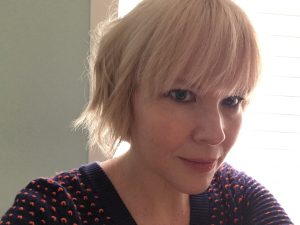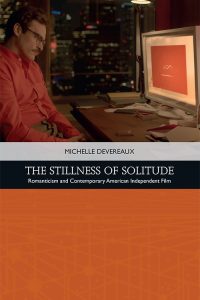
The Stillness of Solitude: Romanticism and Contemporary American Independent Film is available now in the Traditions in American Cinema series. Find out more on the Edinburgh University Press website
Tell us a bit about your book.
My book explores the Romantic connections between a selection of seven films from contemporary American filmmakers: Sofia Coppola, Wes Anderson, Spike Jonze, and Charlie Kaufman. Linking the current socio-cultural moment, which has been described as ‘metamodern’, to the Romantic era, I show how the Romantic relation to selfhood, intersubjectivity, and ‘being in the world’ informs all the films I study. The first section of the book lays out the aesthetic argument, the second describes the role of imagination and emotion in creating that aesthetic, and the third explores narratives of personal growth and their relation to cultural history. Along the way I engage with gender, childhood, the artistic process, revolution, scepticism, the natural world, love, and death. My goal was to articulate how these filmmakers practice a form of Romantic philosophy on a not-necessarily-conscious level, which says some surprisingly provocative things about the world we live in today and the human condition in general. I realise that sounds very grandiose, but I didn’t know that’s where the project was heading when I started! Inevitably, though, that’s where it led me.
What inspired you to research this area?
In 2008, I wrote my master’s dissertation on Michel Gondry, in which I looked at the concept of play in the director’s films, music videos, and advertisements and touched on some of the ideas I explore deeply in my book. During that time, I got to thinking about Gondry’s many compatriots in American indie cinema who have similar artistic points of view, and what these views might have been shaped by. These filmmakers have often been grouped together, but I felt like the reasons for the deep connections in their work were never fully explored. I realised that they were all inherently Romantics, unlike, say, the indie filmmakers responsible for 1990s ‘smart’ cinema, whose films held a more nihilistic world view. The filmmakers I settled on all represent different facets of Romantic aesthetics and philosophy that I thought would be interesting to explore. They’re also all well-known (albeit to varying degrees), which would allow me to show how Romantic ideas had become popularised, if not entirely mainstream, in 21st-century American culture. However, I started with an interest in the films, not how they describe a philosophy: I took great pains to have this be a ‘film-first’ book on film.
What was the most exciting thing about this project for you?
The most exciting part of researching the book was discovering Romantic and post-Romantic philosophical texts that articulate my own personal philosophies better than I ever could myself. On that level, this project became really personal. I found myself asking questions about identity and my own relation to the world that I realised I’ve been grappling with on some level both as a scholar of film, and as a person, for most of my life post-childhood. It became strangely therapeutic, even profound. I also really enjoyed doing close analyses of the films—many of which I felt a deep connection to before researching—in order to pinpoint why they seemed so meaningful to me. To say this book represents a ‘personal journey’ sounds irredeemably cheesy, but it really does.
Did you discover anything particularly strange or surprising?
One of the things that struck me during my years-long exploration of Romanticism was how much diversity there is to be found under this umbrella term. The idea of ‘romanticising’ something has become synonymous with sentimentalising it, but Romanticism is inherently complex. Bald sentimentality is anathema; above all, Romantics embrace ambivalence. Within British Romanticism alone, there are numerous philosophical, artistic, and even political contradictions. Those contradictions made it difficult to form a blueprint for filmic study, but eventually I learned to embrace them. A book about something so inherently diffuse and nebulous as Romanticism necessitated a similar sort of methodology, and I like to think that my writing itself reflects a Romantic point of view.
Did your research take you to any unexpected places or unusual situations?
I hadn’t come across the term ‘metamodernism’ before starting my research, but eventually it became its underlying principle, a concrete way to articulate the link between the Romantic era and our own. I had been focusing on postmodernism but struggled with how it failed to articulate the inherent meaningfulness of my corpus. While there is much connective tissue between Romanticism and postmodernism, its de-emphasis of emotion became a problem. I found myself asking, ‘What happens post-postmodernism?’ When I came across Timotheus Vermeulen and Robin van den Akker’s ‘Notes on Metamodernism’ essay from 2010, it was a revelation. It encapsulated the ideas my work was raising, and the authors even linked the concept to Romantic irony. Everything finally gelled.
Has your research in this area changed the way you see the world today?
I’m not sure if it’s changed how I see the world so much as illuminated why I see the world the way I do. Obviously, I learned a great deal. I won’t say I reached a greater understanding of the human experience (that would definitely be too grandiose). But perhaps the ultimate understanding I did reach is that it’s impossible to ever achieve a ‘true’ understanding of such a monumental thing as the human experience. Much of the book is about personal alienation and the suffering it can bring, and through closely studying the work of historical and contemporary artists I definitely began to feel less alone in my thoughts, and perhaps in the world.
What’s next for you?
I’ve been inspired by my work on this book to continue studying philosophical scepticism in the cinema, but from a more specific angle. The post-Romantic philosophy of Stanley Cavell, which I discuss in my chapter on Her, poses some provocative questions about scepticism and its relation to gender. For my next project, I want to look at how contemporary cinema explores scepticism through gender, using a corpus of films primarily directed by women, with a few male-directed films for contrast. Does the fact a film is made by a woman alter its relationship to scepticism? The films will feature both male and female protagonists: I’ve dubbed the former the ‘melodramas of masculine madness’ and the latter films of ‘feminine rage and (re)construction’.

Michelle Devereaux is a film journalist and scholar. She received her doctorate in Film Studies from the University of Edinburgh and has taught film theory, history and criticism at the University of Edinburgh and the University of Birmingham. She is a board member of intersectional feminist journal on visual culture MAI and currently lives in British Columbia, Canada.






